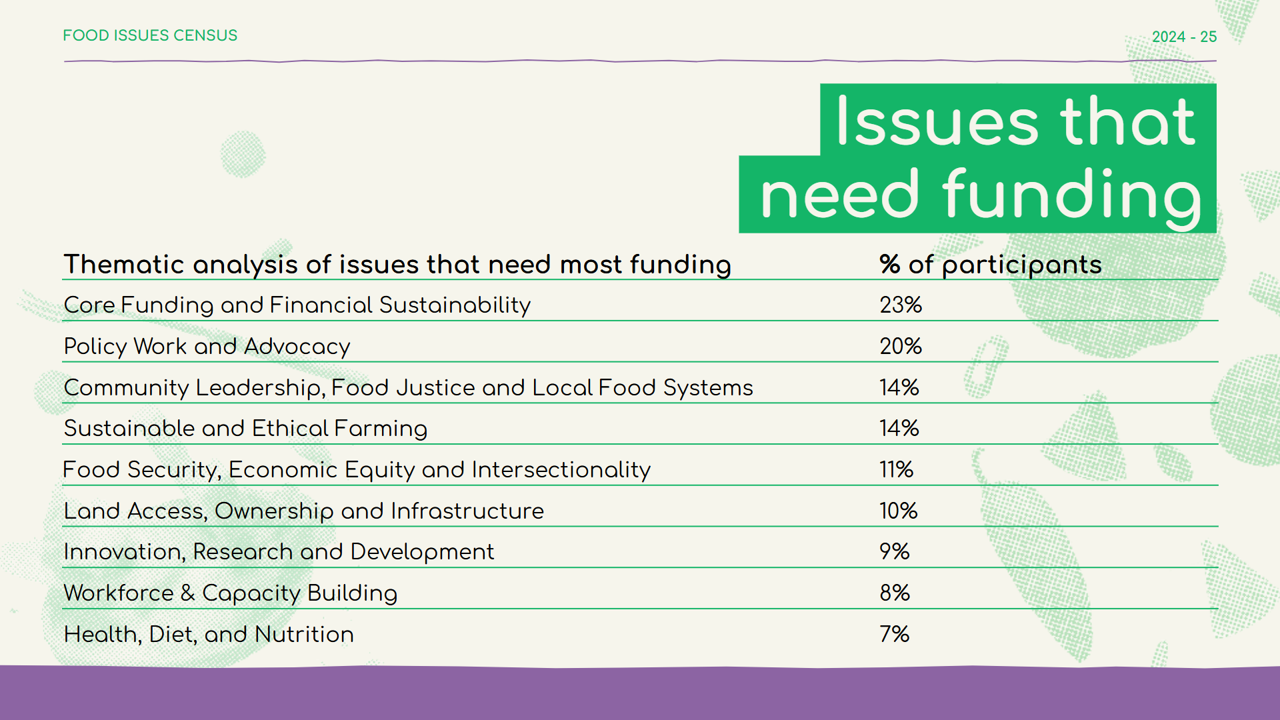
Food Issues Census 2024-25 launch events in Bristol and Belfast, accompanied by an engaging online webinar, proved to be moments of inspiration, reflection and togetherness.
We were delighted to welcome around 60 people to our ‘Food, farming and funding futures’ event at the Royal Photographic Society in Bristol. Funders and civil society organisations involved in the sector came together to hear insights from the Census, connect with others, explore how we can supercharge the sector and be inspired – including by the brilliant ‘We Feed the UK’ exhibition (organised by our friends at the Gaia Foundation). We heard from leading figures including Bonnie Hewson (Farming the Future), Kath Dalmeny (Sustain), Oli Rodker (Ecological Land Coop), Heloise Balme (Bristol Food Network) and Sue Pritchard (Food, Farming & Countryside Commission).
We were also thrilled to launch the Census in Northern Ireland at the amazing temporary home of Brink! in Belfast. Over 30 people from local and national government, community growing, NGOs, academia and local businesses gathered to hear the findings and explore the implications in a Northern Ireland context.
We held an online webinar to explore the results in more depth, which is available to watch back here.
As participants gathered to share, listen, and explore, several key themes emerged that highlighted the urgency and opportunity within the sector. Here are some reflections and insights from these events.
The case for funding civil society work on food and farming is very strong. We just need to articulate the case better. Change food, change the world anyone?

“Storytelling is key. Investing in your comms & storytelling is your fundraising”
(Participant at Food Issues Census event in Bristol)
One of the standout revelations from the Census discussions is the glaring gap in funding for land access, ownership and infrastructure. Putting aside the overarching priority of core funding for many organisations, land justice emerged as one of the top five funding gaps. This issue, intrinsically tied to food systems, underscores the need for equitable access to land, particularly for marginalised communities. Addressing this gap is not just about funding but about reshaping systems to empower those without access to the resources they need to thrive. Other key issues included policy work and advocacy, plus work on food security, equity and intersectionality.

Source: Food Issues Census 2024-25
The events underscored a palpable need for transformative change in how we approach food issues. The status quo is no longer sufficient to tackle the complexities of food systems, inequality, and environmental challenges. Participants highlighted the importance of innovative strategies that respect people’s time, value their input, and create accessible pathways for meaningful participation. The concept of the “inclusion fund” was well-received as a practical step towards ensuring diverse voices are not just included but actively supported. We can’t keep doing things the way we always have – and we must get off the fundraising-burnout treadmill.
Bristol and Belfast offered unique, regionally nuanced perspectives that enriched the discussions. The vibrant food networks in these cities demonstrated the power of localised action, innovation, and community-driven efforts. These events reminded us of the importance of growing and replicating ideas that are rooted in local contexts.
As the Census launches settle into memory, the reflections from these events demand momentum. From ensuring equitable funding allocation to fostering collaboration across regions, the path ahead calls for both bold vision and grounded action. By doing so, we can collectively address the systemic barriers while amplifying the extraordinary energy and ideas that surfaced during these discussions.
These launch events have not only sparked meaningful conversations but have also laid the groundwork for tangible change. The real challenge lies in carrying forward this momentum and ensuring that these insights translate into sustained impact across the food systems landscape.

The Food Issues Census is more than a data-gathering exercise. It’s a way to map, connect, and amplify the movements shaping the future of food across the UK. We invite everyone with a stake in its future to use the results as a springboard to imagine new ways of doing things, to challenge the status quo, and to build a system that nourishes people, animals and planet alike. In particular, we encourage funders and civil society organisations to use the insights and data, to attract more funding into this vital sector, and to target our work (even) more effectively.
